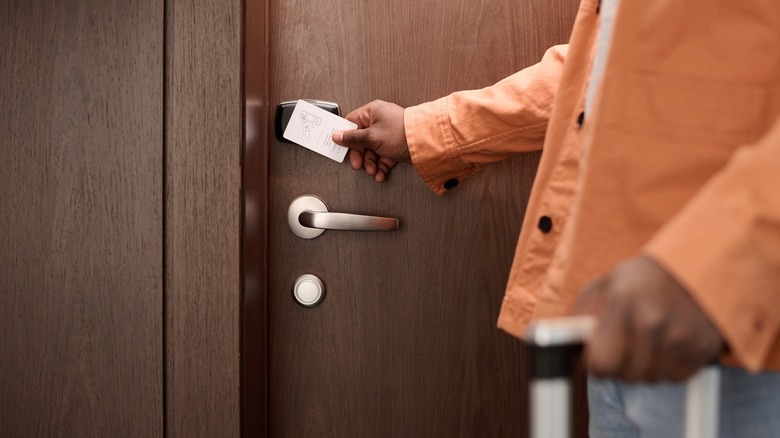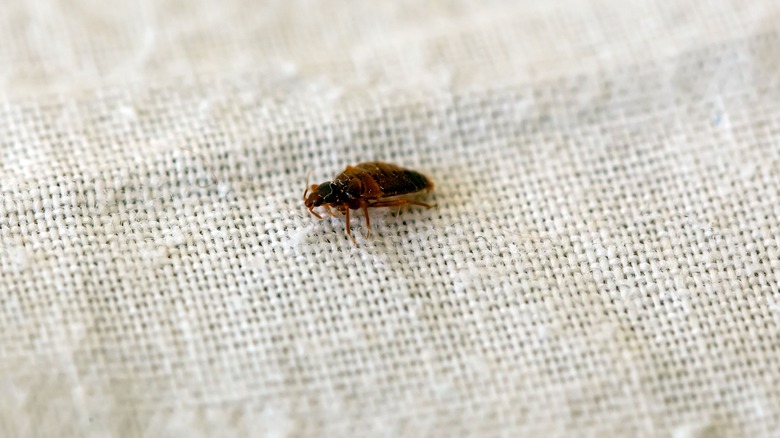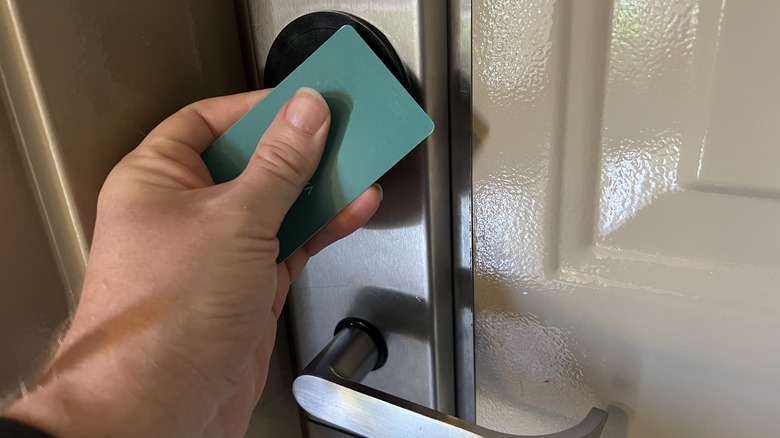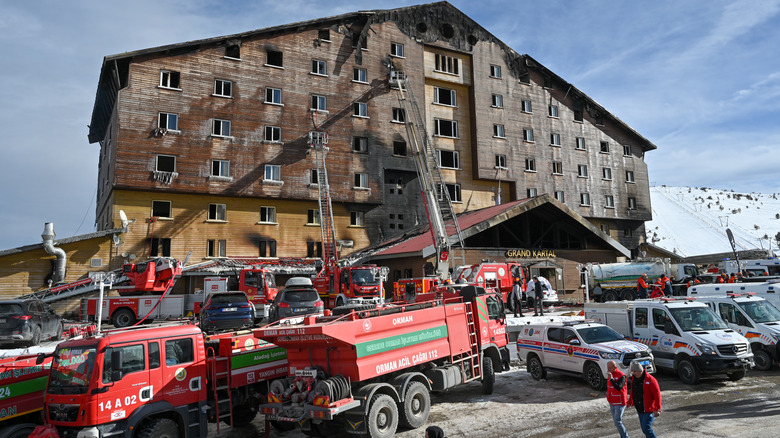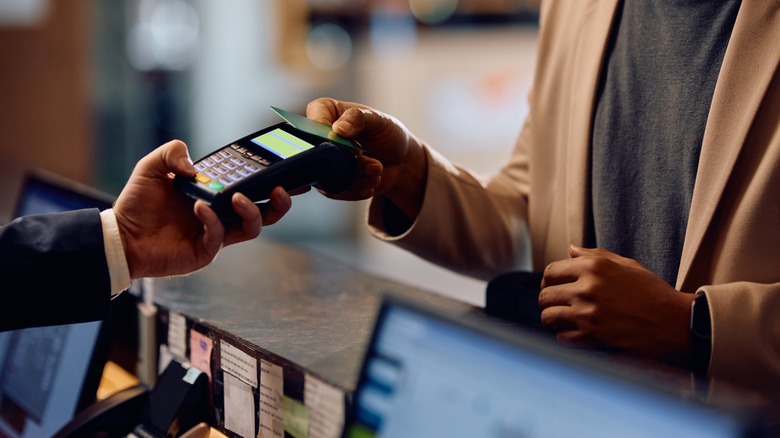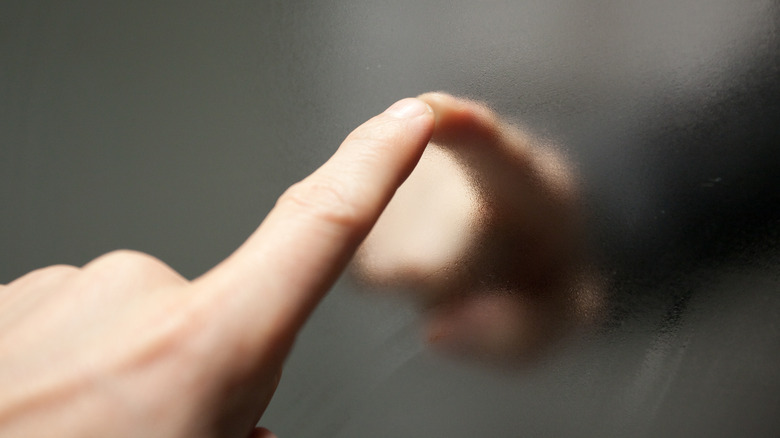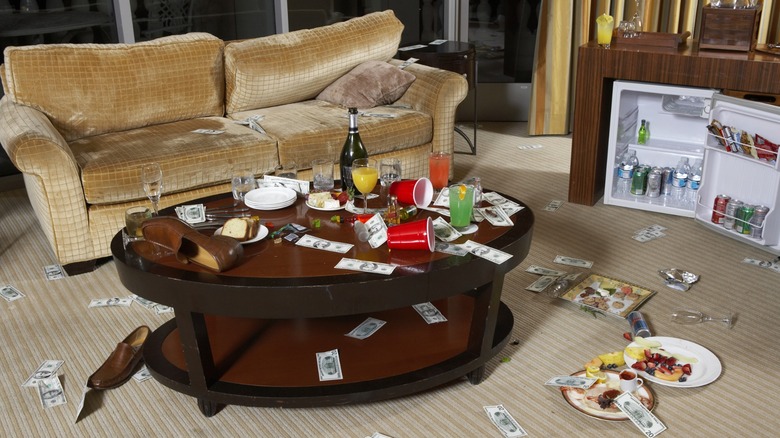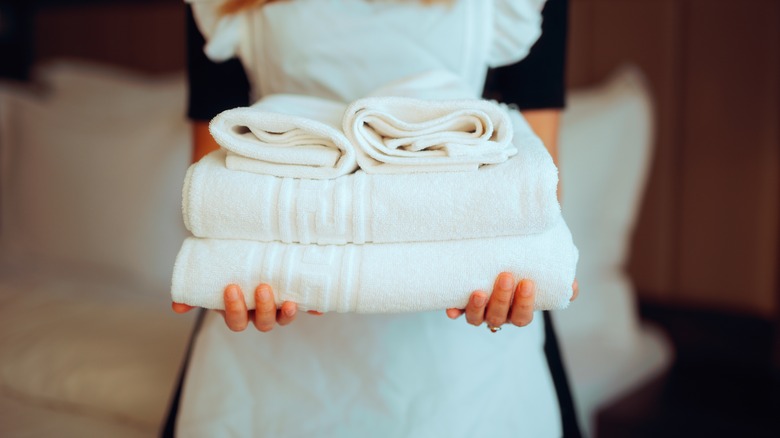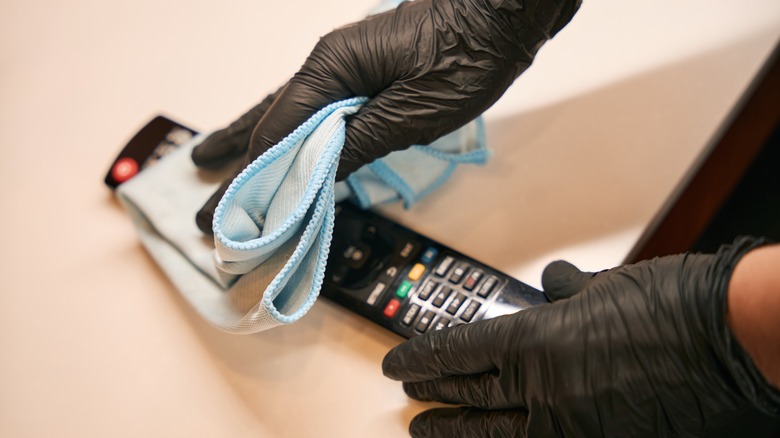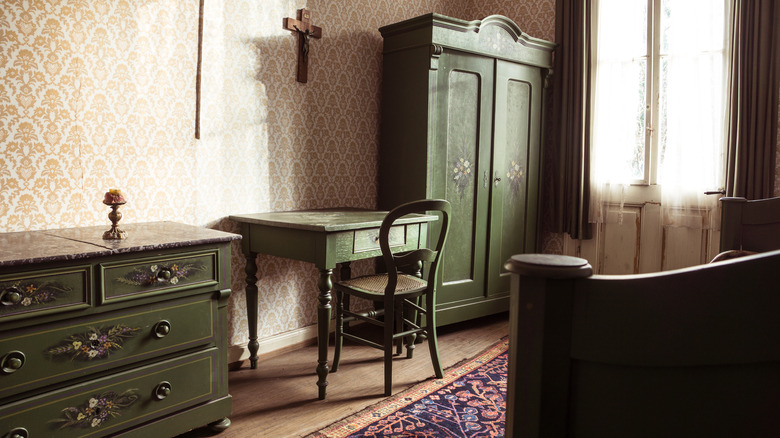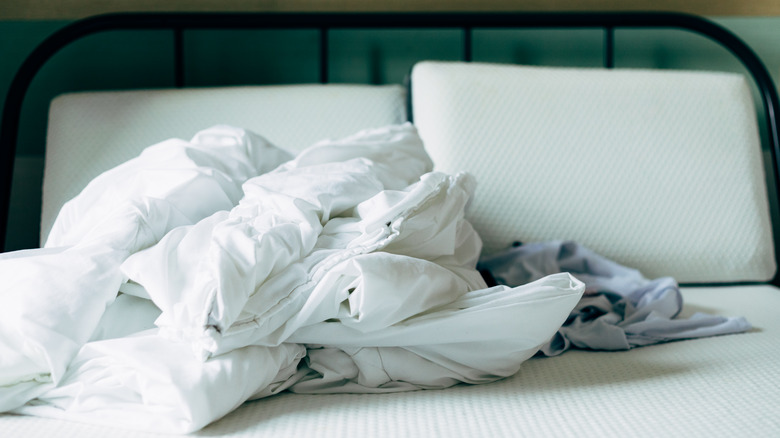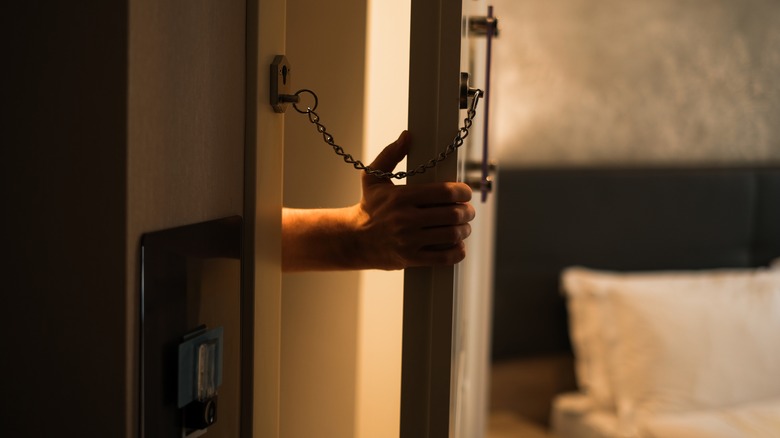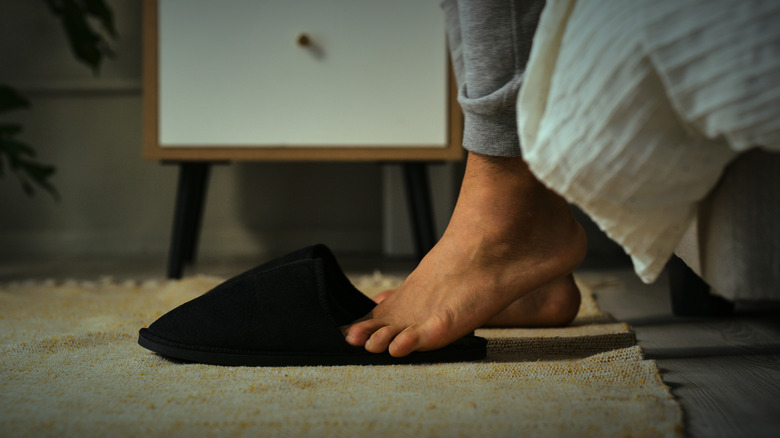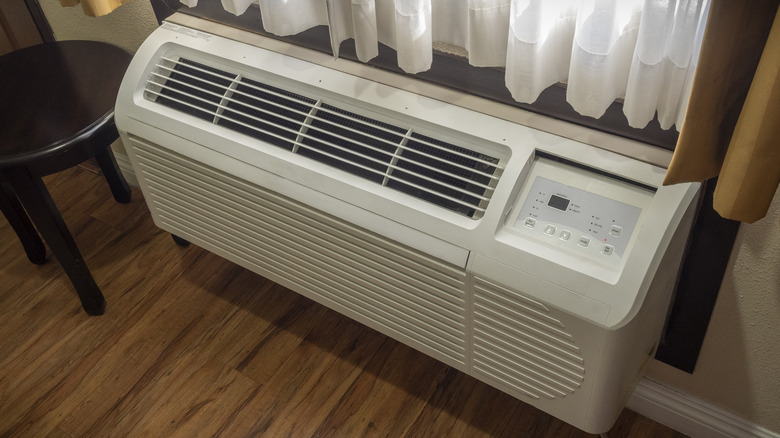The Most Horrifying Details About Almost All Hotel Rooms
We may receive a commission on purchases made from links.
Whether you're a travel pro who knows all the simple tricks to get extra perks when you check into your hotel or a getaway novice, there are some things about your accommodation you may have never considered. We trust hotels, Airbnb rentals, and everything in between to keep us safe and healthy, but there are some things that even the best-rated companies don't want you to know. Most of the time, there's a high turnover of guests which can be challenging to deal with, and while we would like to think that nothing slips through the cracks, sometimes standards can (and absolutely do) slip.
Cleanliness isn't the only thing to be wary of when you spend a night away from home, either. Hotels present unique risks, from charging you more money on the sly to being a hotbed for criminal activity, paranormal entities, and much more. Before you book your next stay, brush up on the facts — knowledge is power, and you may need it more than you think.
Bed bugs are everywhere
When you check in, don't put luggage on your hotel bed for this one gross reason. Unfortunately, bed bugs can be rife in hotels purely because of how many people pass through them. Even if you think you haven't ever come into contact with them, you probably have. In 2024, The Sleep Doctor released a worrying survey detailing just how common these little critters really are. According to the data, 14% of U.S. travelers had a bed bug experience while traveling, and they weren't necessarily staying in budget motels. In fact, 20% of reported encounters came from 5-star hotels — places you wouldn't ever expect to have infestations.
Of course, there are things that hotels do to try and prevent the spread of bed bugs, such as changing the linens after every stay, but the sad fact is that they sometimes go undetected as they cling to upholstery and other materials. Bed bug bites can get very inflamed and itchy, which isn't what you want when you're trying to enjoy your vacation. If you want to make sure you don't run afoul of these beasts, try packing a handy travel-size repellent, like this BugMD Bed Bug and Mite Spray and BugMD Buzz Shield bundle. When you get home, wash all of your clothing on a hot wash to eradicate any stow aways.
More people have access to your room than you think
Hotels are supposed to be safe havens, where you can kick back, relax, and get some respite from your day-to-day life. There's a level of trust that comes with this, as guests rightly like to think that no one will enter their rooms without their say-so. While it's a given that staff members can gain entry in case of emergency or for housekeeping, more people may have access to your room than you think. These days, it's typical for hotels to give their guests a key card instead of an old-fashioned physical key. While this is handy, these have been known to malfunction, meaning that anyone could access your room.
Similarly, hotel staff and processes aren't infallible either. If there's even just a momentary lapse in security protocol, cards can be anyone's for the taking. If you're concerned, there's no harm in mentioning it to the front desk and asking what steps they have in place to ensure nothing untoward happens. They should willingly talk you through their processes to give you peace of mind.
Fires can and do happen
No one likes to think of a devastating accident happening while they're on vacation, but nowhere is totally exempt from risk. In January 2025, a devastating fire broke out at the Grand Katal Hotel in a ski resort in Turkey. 60 people were killed in the blaze, which started in a kitchen on the fourth floor. It took the fire service 45 minutes to arrive, and despite the hotel holding a fire safety certificate, guests reported that no alarms sounded as the fire took hold. One man said that they only escaped because his wife smelled the fire.
While fires of this magnitude aren't necessarily common, fires can quickly spread in hotels. In England alone, over 6,400 hotel fires were reported within four years. Among the main causes listed were electrical equipment and cooking oils and fats used in on-site restaurants. All hotels should be compliant with fire safety rules and each exit should be carefully signposted. Before settling in for the night, be sure to know your closest exit in case the worst happens. Navigating smoke-filled corridors in an unknown place will only put you in more danger.
Beware of hidden fees
While you may be all too aware that Airbnb hosts hide additional fees, you may not know that hotels can be just as sneaky. We're not just talking about the extortionate bill you can quickly rack up by raiding the mini bar, either. It's not uncommon for hotels to charge you for the privilege of using the safe in your own hotel room, for using the wifi, and even for drinking that bottle of water placed by your bedside. It may seem underhanded, but the hospitality industry is competitive, and companies will often do what they can to make some extra cash.
When you make the booking, read through the terms and conditions very carefully so you're fully aware of what's included in your stay. If you get into your room and have some questions, give the front desk a quick call to ensure you're not adding another zero to the end of your bill. It's better to be safe than to end up paying for something you haven't budgeted for.
Checking your mirrors is a must
Safety is paramount when you're traveling, regardless of whether you're going on a month-long trip around Europe or an overnight business stay. In recent years, tales of two-way mirrors in independent rental accommodation, such as Airbnb properties, have surfaced. A user named Percbog took to the Money Saving Expert Forum to detail a strange experience they had in 2024. They explained that a hallway mirror posed a strange problem. "The mirror was a see-through film, that looks like a mirror on 'our' side but could allow the corridor to be viewed through the other side," they wrote. "When I cupped my hands around my eyes and looked through the mirror [on our] side, I could clearly see another room on the other side."
Thankfully, there's a way to check this. Simply put your finger up against the mirror. If there's a space between your finger and its reflection then you're good to go. However, if your finger looks like it's directly touching the reflection, this could indicate a problem and you should call the hotel owner or host immediately.
Previous guests often leave unsavory items behind
If you're a frequent traveler, chances are you've found something someone has left behind at some point. It may have been a cotton bud, or a pair of glasses tucked away at the back of a drawer. While housekeeping is always on the lookout for any forgotten possessions as they turn the room over, sometimes things get missed — and they aren't always harmless. One Redditor recalled a disturbing discovery. "Not me, but when I used to travel for work up to DC, one of my coworkers found a severed finger between the bed and nightstand. We decided to stay at another hotel chain after that."
Another user also had a similar (although less bloody) experience in the past. "I found a pistol underneath my mattress at a hotel 20 years ago," wrote u/Timmy24000. With that in mind, it's always best to give the room a quick sweep before you settle in, especially if you're traveling with children.
Towels aren't always changed between guests
One of the nicest things about staying in a hotel is having fresh, clean towels waiting for you on arrival. It's a luxury to not have to worry about laundry, and we assume that towels are meticulously cleaned with strong detergent between every guest. Yes, housekeeping does typically launder used towels that are clearly soiled, but what about the ones that haven't been used? That answer is a little more vague. If some towels are still rolled up or folded and look untouched, hotels won't always replace them during turndown.
Even though they may think they're clean, it doesn't mean they're bacteria-free. Sure, they may look great, but unused towels that have been left in a bathroom for a few days will still pick up nasty bacteria from defecation and more — and you never know who's touched them. Housekeeping staff have to get through a lot of rooms in a short time, so maybe it's not all that surprising that some workers cut corners to keep on schedule.
TV remotes can harbor nasty bacteria
The grossest spots in hotel rooms you shouldn't be touching may surprise you. Common sense tells you not to go rooting around in the bathroom bin or licking the sink, but there are other surfaces that pose just as much of a risk to your health. Housekeeping tries to keep everything as clean as possible, but it's not always easy to get into the nooks and crannies of a TV remote. Remotes are one of the worst places for bacteria, largely because people don't wash their hands in between using them. They could have been eating with their hands before quickly changing the channel, and remotes often get left in beds overnight.
Many travelers opt to bring a pack of antibacterial wipes with them to combat any issues, but there's no guarantee they'll work completely. Instead, we recommend packing a clean Ziploc bag and putting the remote in there once you arrive. The remote is perfectly usable, but the bag acts as a protective layer between you and any nasties that might be lurking. When you leave, simply put the bag in the bin to avoid bringing any germs home with you.
Your room may already have otherworldly guests
Whether you're a believer in the afterlife or not, there's no denying that some hotels have a distinct eerie vibe. Some businesses thrive off of having a reputation for being haunted and they tailor their marketing to a ghost-loving audience, while others prefer to keep any otherworldly incidents under wraps. One of America's most famous haunted hotels is The Stanley in Estes Park, Colorado. The expansive property was Stephen King's inspiration for "The Shining" and to this day, the business relies on ghost tours to make some extra cash.
Others of note include The Red Lion Inn in Stockbridge, Massachusetts, and Hotel Monteleone in New Orleans, not to mention the insanely old hotels scattered around the world. Ghostly experiences in hotels are so common there are several Reddit threads dedicated to the subject. One user, u/Educational_Ad_2916, shared, "The hotel I worked at had a ghost that would call 911 from a room on the 3rd floor, another time it called the front desk and played 'Highway to Hell' through the phone." Another Redditor, u/ummacles123 said of their own experience, "We had ghost diving into the pool, candles burning when people came to work and cleaners quit on the spot, they heard their name being whispered, stuff falling off shelves, etc."
Bedsheets often aren't washed correctly
Typically, the bedding isn't one of the nastiest items in a hotel room, but it's not always totally clean, either. Large chain hotels often send their laundry out to another company because of the sheer amount of it constantly coming through. While this is understandable, this means there's little control over the washing of the sheets. One hotelier, Shirley Trinder, told JLA, "We used to outsource our laundry, and it was very expensive even though the quality wasn't great. We tried every company we could find, but the washing always came back stained, damaged, or creased."
However, smaller hotels may rely on domestic washing machines to wash the linens, which won't do the best job either. It's common for washers to be overloaded, meaning the sheets don't get thoroughly cleaned. Bacteria lingers on sheets, so a good wash is crucial in keeping them germ-free. What's more, blankets and throw pillows often don't get washed at all, so make sure you're taking those off the bed before you settle in.
Hotel crime is rife
No one wants to think that they will become a victim of crime when they're on vacation, but it can happen. Thefts from hotel room safes aren't unheard of, but there can often be other nefarious things going on that don't bear thinking about. In 2021, a maid in a Chicago hotel found a hotel room stacked full of guns while doing a turndown. The weapons belonged to Keegan Casteel, and it's thought that the discovery helped to prevent what could've been a devastating mass shooting. It's not just America that has hotel links to crime, either.
In 2024, a man called Paul Green was found to be operating a drug operation out of a hotel room near Widnes in England. On top of these bigger incidents, common hotel crimes can include predatory behavior and car burglary. Not every traveler will encounter instances like this, but it's good to be aware of the risks when visiting any establishment. Solo travelers can feel particularly vulnerable, but creating the illusion that you're not alone can help you feel (and be) safer when staying at a hotel.
Beware of the hotel room floor
Did your parents ever warn you about walking barefoot around the pool, in case you pick up a verruca? As much as we hate to say it, that methodology also applies to hotel room floors. Housekeeping will vacuum and mop the floors of each room accordingly, but this is another instance where things may get missed. With so many rooms to turn down, they may miss certain spots in their haste. The University of Houston previously conducted a study that showed floors were often hotbeds for bacteria, listing them alongside toilets and bathroom sinks.
When you next pack for a trip, throw in a pair of slippers or flip-flops that you can wear while walking around the room. If you want to be extra safe and not run the risk of bringing anything home with you, you could buy throwaway ones, like these Geyoga house slippers for guests. It may be an added expense, but who wants to tread someone's fecal bacteria through their own house? We'd take a wild guess and say absolutely no one.
The air quality in many hotel rooms is dubious
Air quality is incredibly important, regardless of whether you're at home or away. The vast majority of hotel rooms come equipped with an air conditioning unit, but just because it's working doesn't mean that it produces good quality air. Many hotel AC units can emit volatile organic compounds (VOCs) that are harmful to humans. Among other things, they can cause airway irritation, headaches, and even nausea. Hotels are particularly susceptible to this danger, especially if the AC units are old and not properly maintained.
If the AC unit isn't cleaned properly, lots of dust and other nasties can get clogged up inside them. The moment a guest turns it on, the bacteria and VOCs enter the air, degrading the air quality and causing unseen issues. AC units aren't the only thing to blame. Strong chemical cleaning products can leave traces in the air, and mold can soon build up in hard-to-reach places if the room isn't well-ventilated. If you ever check into a hotel room and there's a musty or chemical odor, call the front desk and express your concerns. Similarly, if you notice any damp or mold, make it known to staff and request another room.
